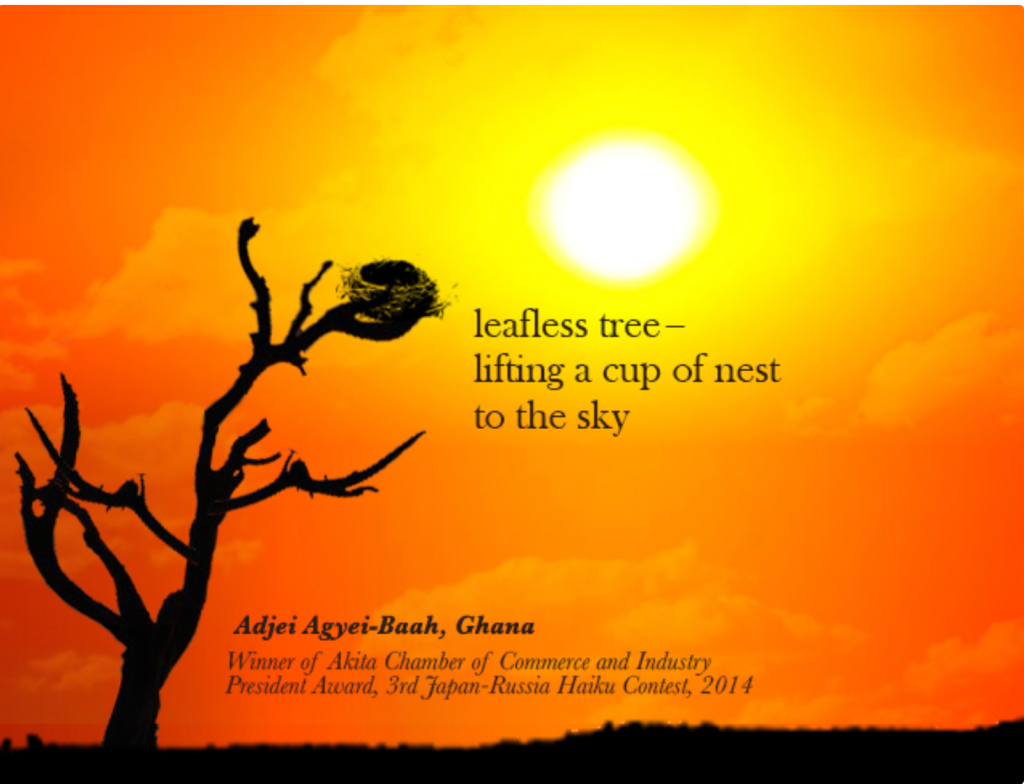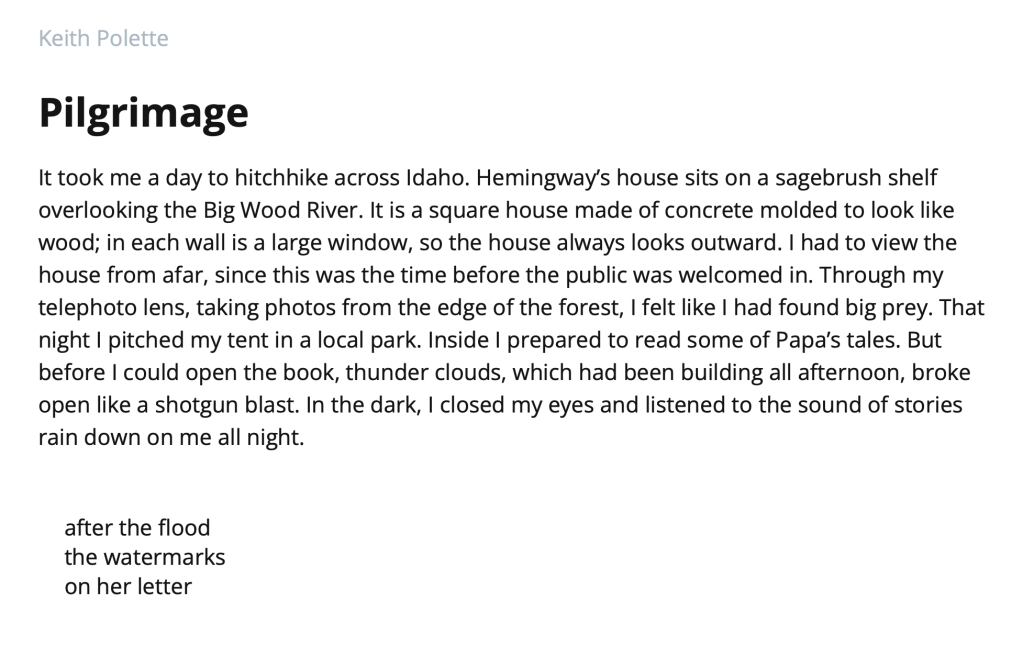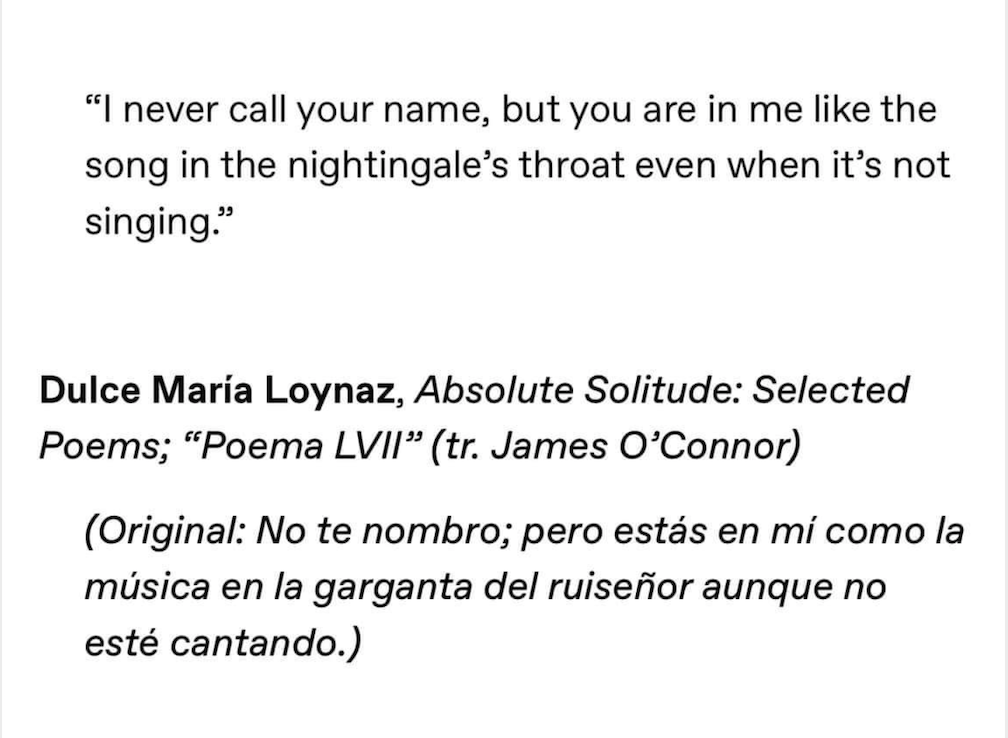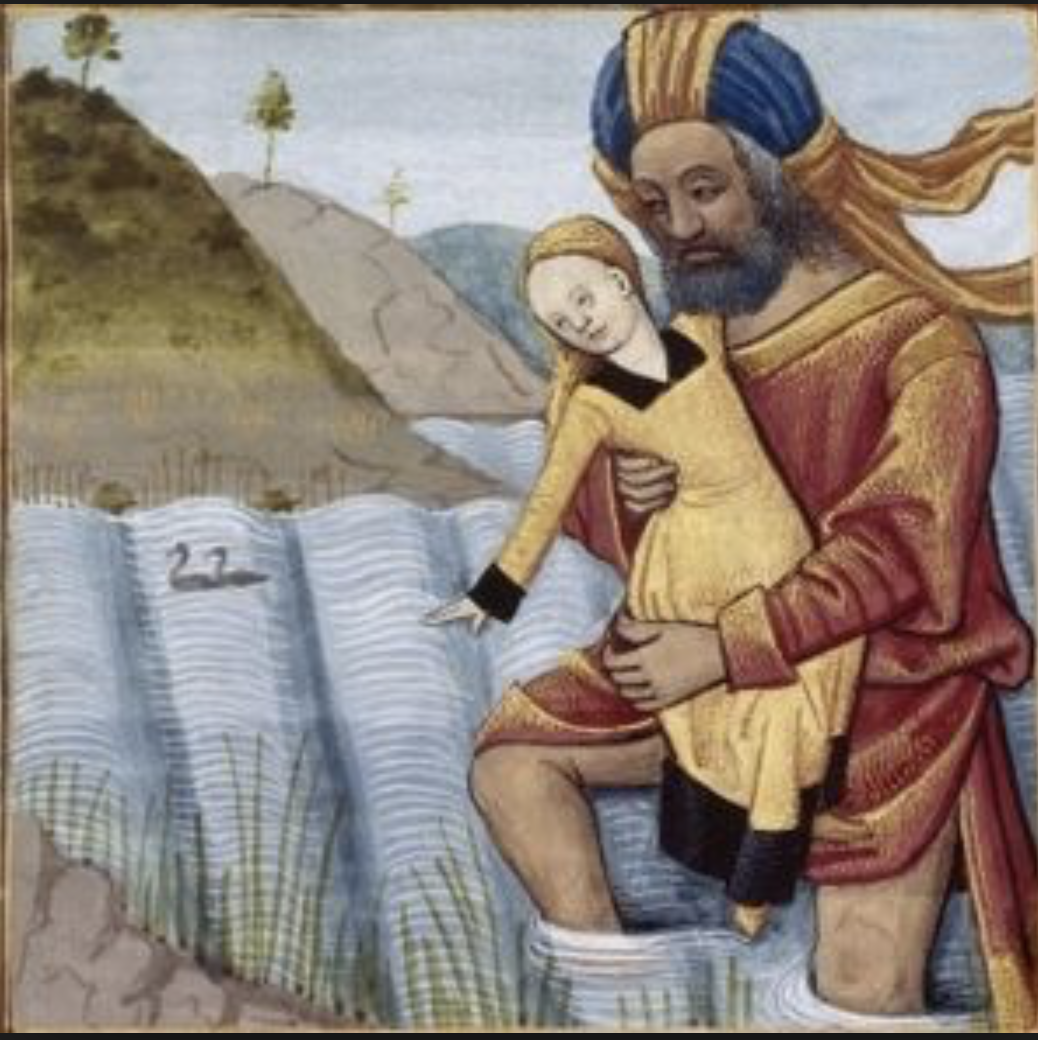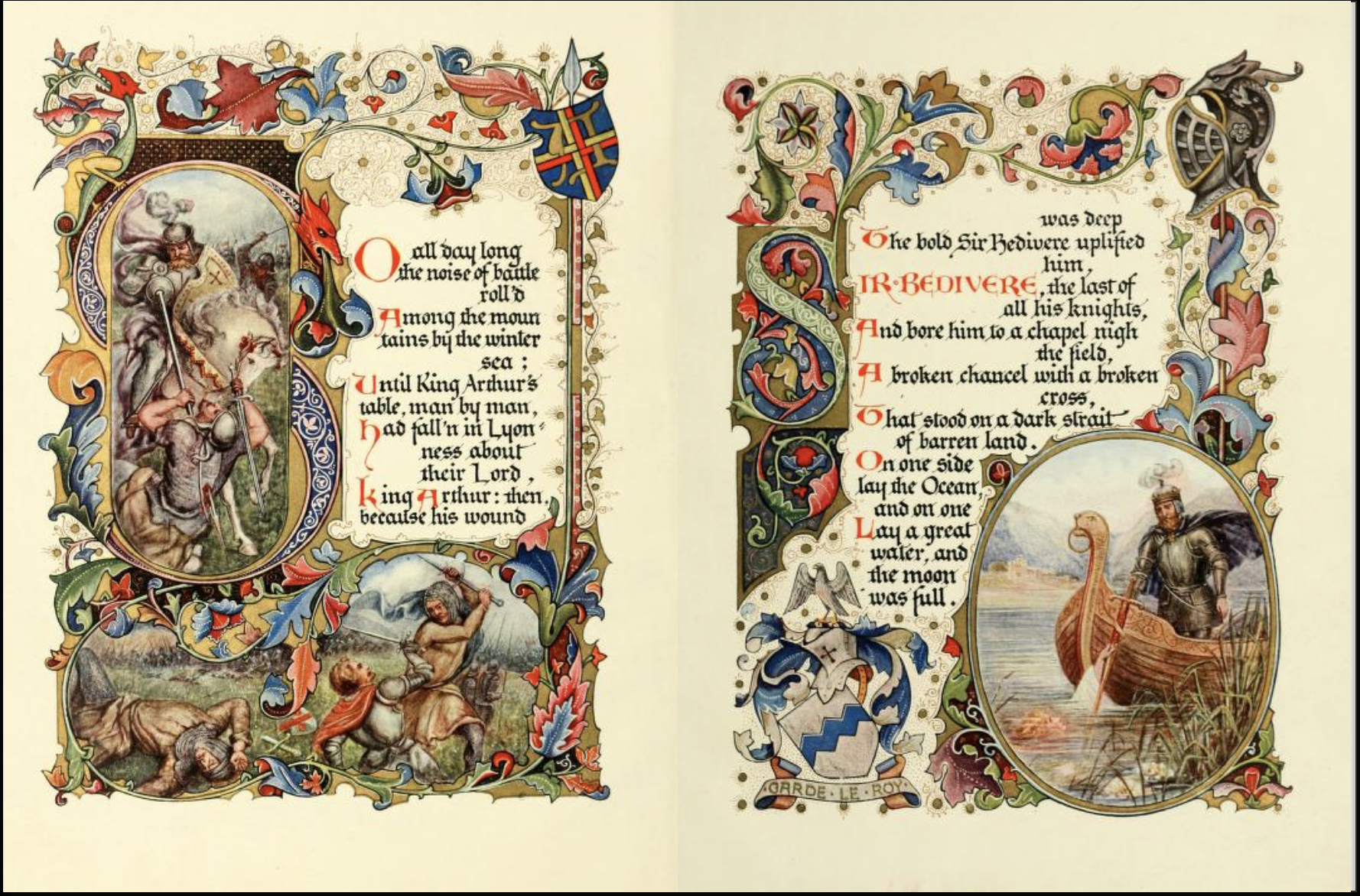
Posted in A Poet's Education, Images, Poetry Lessons, The Daily Poems, The Reading Journals | Tagged Adjei Agyei-Baah, Ghana, haiku | Leave a Comment »
Here sits the Unicorn
In captivity;
His bright invulnerability
Captive at last;
The chase long past,
Winded and spent,
By the king’s spears rent;
Collared and tied
To a pomengranate tree-
Here sits the Unicorn
In captivity,
Yet free.
Here sits the Unicorn;
His overtakelessness
Bound by a circle small
As a maid’s embrace;
Ringed by a round corral;
Pinioned in place
By a fence of scarlet rail,
Fragile as a king’s crown,
Delicately laid down
Over horn, hoofs, and tail,
As a butterfly net
Is lightly set.
He could leap the corral,
If he rose
To his full white height;
He could splinter the fencing light,
With three blows
Of his porcelain hoofs in flight-
If he chose.
He could shatter his prison wall,
Could escape them all-
If he rose,
If he chose.
Here sits the Unicorn;
The wounds in his side
Still bleed
From the huntsmen’s spears,
Yet he takes no heed
Of the blood-red tears
On his milk-white hide,
That spring unsealed,
Like flowers that rise
From the velvet field
In which he lies.
Dream wounds, dream ties
Do not bind him there
In a kingdom where
He is unaware
Of his wounds, of his snare.
Here sits the Unicorn;
Head in a collar cased,
Like a girdle laced
Round a maiden’s waist,
Broidered and buckled wide,
Carelessly tied.
He could slip his head
From the jewelled noose
So lightly tied –
If he tried,
As a maid could loose
The belt from her side;
He could slip the bond
So lightly tied –
If he tried.

Here sits the Unicorn;
Leashed by a chain of gold
To the pomengranate tree.
So light a chain to hold
So fierce a beast;
Delicate as a cross at rest
On a maiden’s breast.
He could snap the golden chain
With one toss of his mane,
If he chose to move,
If he chose to prove
His liberty.
But he does not choose
What choice would lose.
He stays, the Unicorn,
In captivity.
In captivity,
Flank, hoofs, and mane –
Yet look again –
His horn is free,
Rising above Chain, fence, and tree,
Free hymn of love; His horn
Bursts from his tranquil brow
Like a comet born;
Cleaves like a galley’s prow
Into seas untorn;
Springs like a lily, white
From the Earth below;
Spirals, a bird in flight
To a longed-for height;
Or a fountain bright,
Spurting to light
Of early morn –
O luminous horn!
Here sits the Unicorn –
In captivity?
In repose.
Forgotten now the blows
When the huntsmen rose
With their spears; dread sounds
Of the baying hounds,
With their cry for blood;
And the answering flood
In his veins for strife,
Of his rage for life,
In hoofs that plunged,
In horn that lunged.
Forgotten the strife;
Now the need to kill
Has died like fire,
And the need to love
Has replaced desire;
Forgotten now the pain
Of the wounds, tthe fence, the chain –
Where he sits so still,
Where he waits Thy will.
Quiet, the Unicorn,
In contemplation stilled,
With acceptance filled;
Quiet, save for his horn;
Alive in his horn;
Horizontally,
In captivity;
Perpendicularly,
Free.
As prisoners might,
Looking on high at night,
From day-close discipline
Of walls and bars,
To night-free infinity
Of sky and stars,
Find here felicity:
So is he free –
The Unicorn.
What is liberty?
Here lives the Unicorn,
In captivity,
Free.
Posted in Images, The Daily Poems | Tagged Anne Morrow Lindbergh, Christ, the unicorn in captivity, Unicorn | Leave a Comment »
I called through your door.
“The mystics are gathering
in the street. Come out!”
“Leave me alone.
I’m sick.”
“I don’t care if you’re dead!
Jesus is here, and he wants
to resurrect somebody!”
Rumi, 12 c. Sufi mystic
(trans. Coleman Barks)


Posted in Uncategorized | Leave a Comment »
Posted in Uncategorized | Tagged I never call your name, Loynaz | 2 Comments »

Posted in Images, The Daily Poems, The Reading Journals | Tagged Chrysanthemum, haiga, Salil Chaturvedi | Leave a Comment »
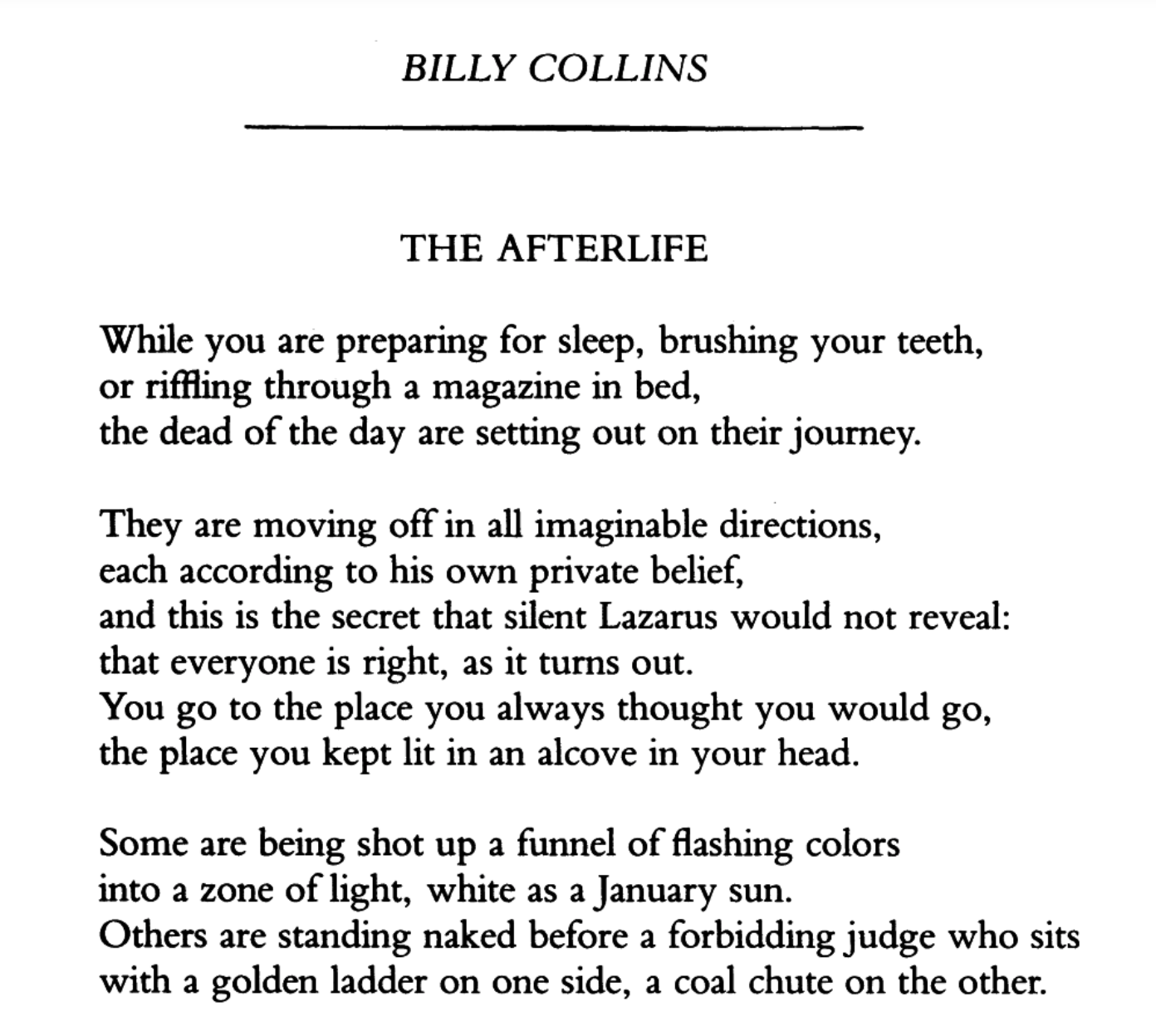
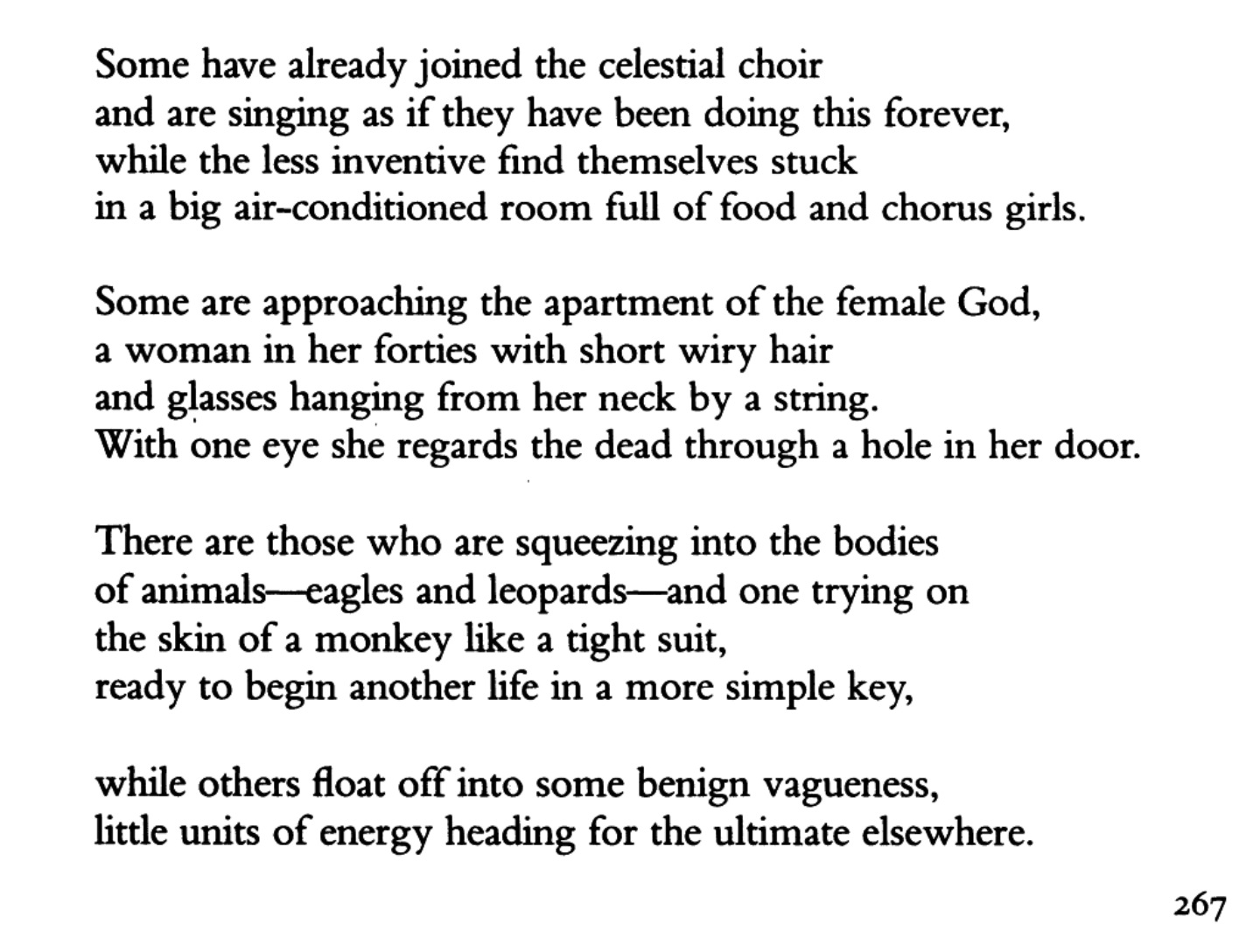

Posted in The Daily Poems | Tagged Billy Collins, Poetry Magazine, The Afterlife | Leave a Comment »
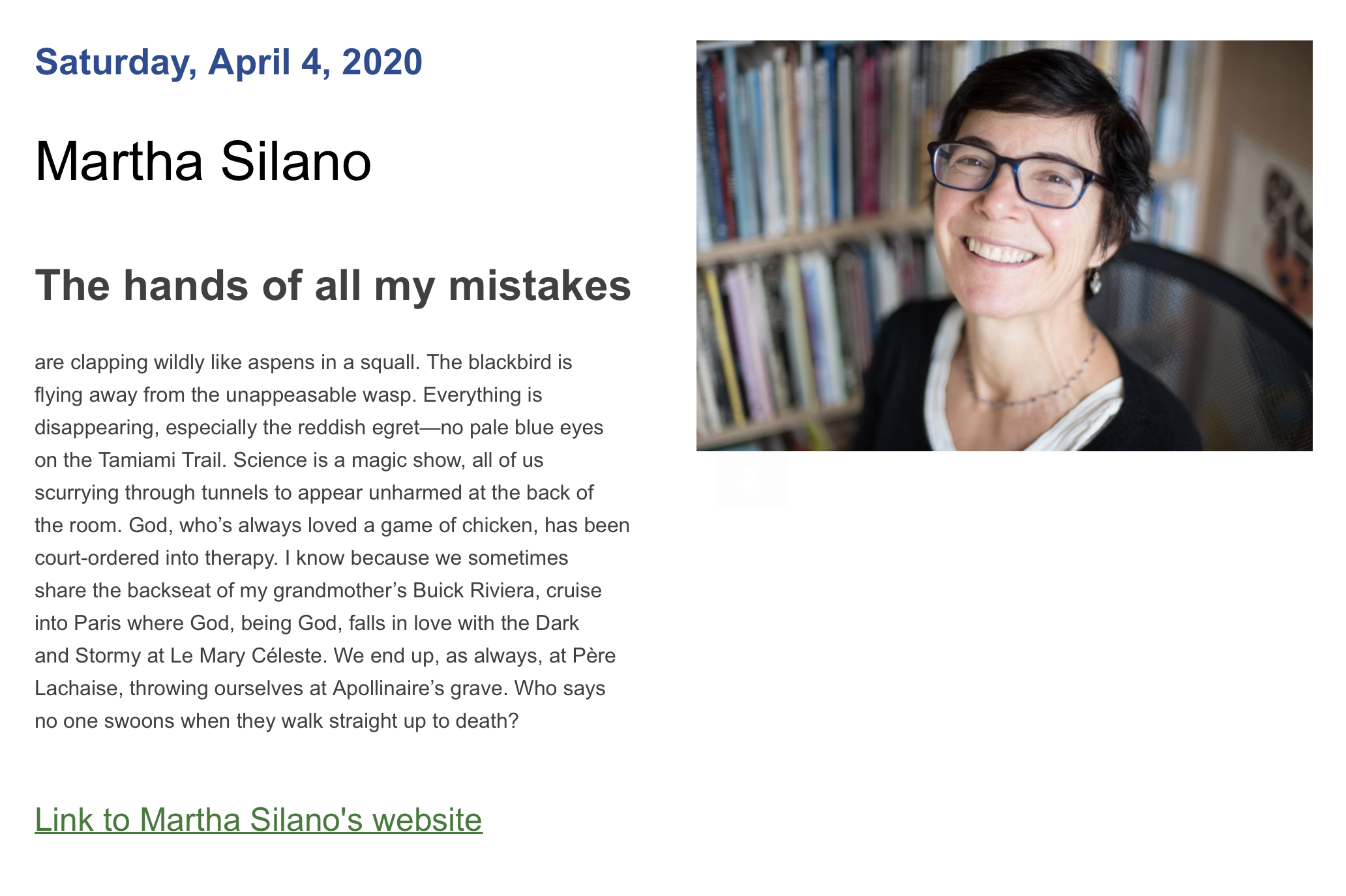
Posted in The Daily Poems | Tagged "the hands of all my mistakes", Martha Silano | Leave a Comment »

Posted in The Daily Poems | Tagged e.e. cummings, may my heart always be open, poem 53 | 1 Comment »
Go placidly amid the noise and haste,
and remember what peace there may be in silence.
As far as possible without surrender
be on good terms with all persons.
Speak your truth quietly and clearly;
and listen to others,
even the dull and the ignorant;
they too have their story.
Avoid loud and aggressive persons,
they are vexations to the spirit.
If you compare yourself with others,
you may become vain and bitter;
for always there will be greater and lesser persons than yourself.
Enjoy your achievements as well as your plans.
Keep interested in your own career, however humble;
it is a real possession in the changing fortunes of time.
Exercise caution in your business affairs;
for the world is full of trickery.
But let this not blind you to what virtue there is;
many persons strive for high ideals;
and everywhere life is full of heroism.
Be yourself.
Especially, do not feign affection.
Neither be cynical about love;
for in the face of all aridity and disenchantment
it is as perennial as the grass.
Take kindly the counsel of the years,
gracefully surrendering the things of youth.
Nurture strength of spirit to shield you in sudden misfortune.
But do not distress yourself with dark imaginings.
Many fears are born of fatigue and loneliness.
Beyond a wholesome discipline,
be gentle with yourself.
You are a child of the universe,
no less than the trees and the stars;
you have a right to be here.
And whether or not it is clear to you,
no doubt the universe is unfolding as it should.
Therefore be at peace with God,
whatever you conceive Him to be,
and whatever your labors and aspirations,
in the noisy confusion of life keep peace with your soul.
With all its sham, drudgery, and broken dreams,
it is still a beautiful world.
Be cheerful.
Strive to be happy.
Max Ehrmann
Posted in A Poet's Education, The Daily Poems | Tagged Desiderata, Max Ehrmann | Leave a Comment »
by Ben von Jagow
The flame dances,
beckons like a siren.
Come tomorrow,
the moth’s final motive
can be found
fossilized in the wax.

Ben von Jagow is a writer and poet from Ottawa, Canada currently living in Denmark. His work has appeared in such literary journals as The Mindful Word, Maudlin House, and The Literary Review of Canada. For more of Ben’s work visit benvj.com or follow him on Instagram: @aquacondor.
Posted in Uncategorized | Leave a Comment »
I will clench onto her hands, like a lost child who has been found.
I will gaze at her face so intently till a crimson colour seeps into her veins, and races towards her cheeks.
I will draw that other half of her smile, the one she once lost among a sea of strangers.
I will fold my hands and turn it into a boat when she drowns.
I will draw a sun on days they don’t shine for her.
I will always be at the corner of her mind having a smoke puffing its wisps blurring out every other stranger trying to seduce her.
I will kiss her tears and promise to be her guardian angel for eternity.
I will hold her hand and play Hide & Seek with her demons till they are afraid of my light.
I will keep painting her into existence with my raw words…
View original post 459 more words
Posted in Uncategorized | Leave a Comment »
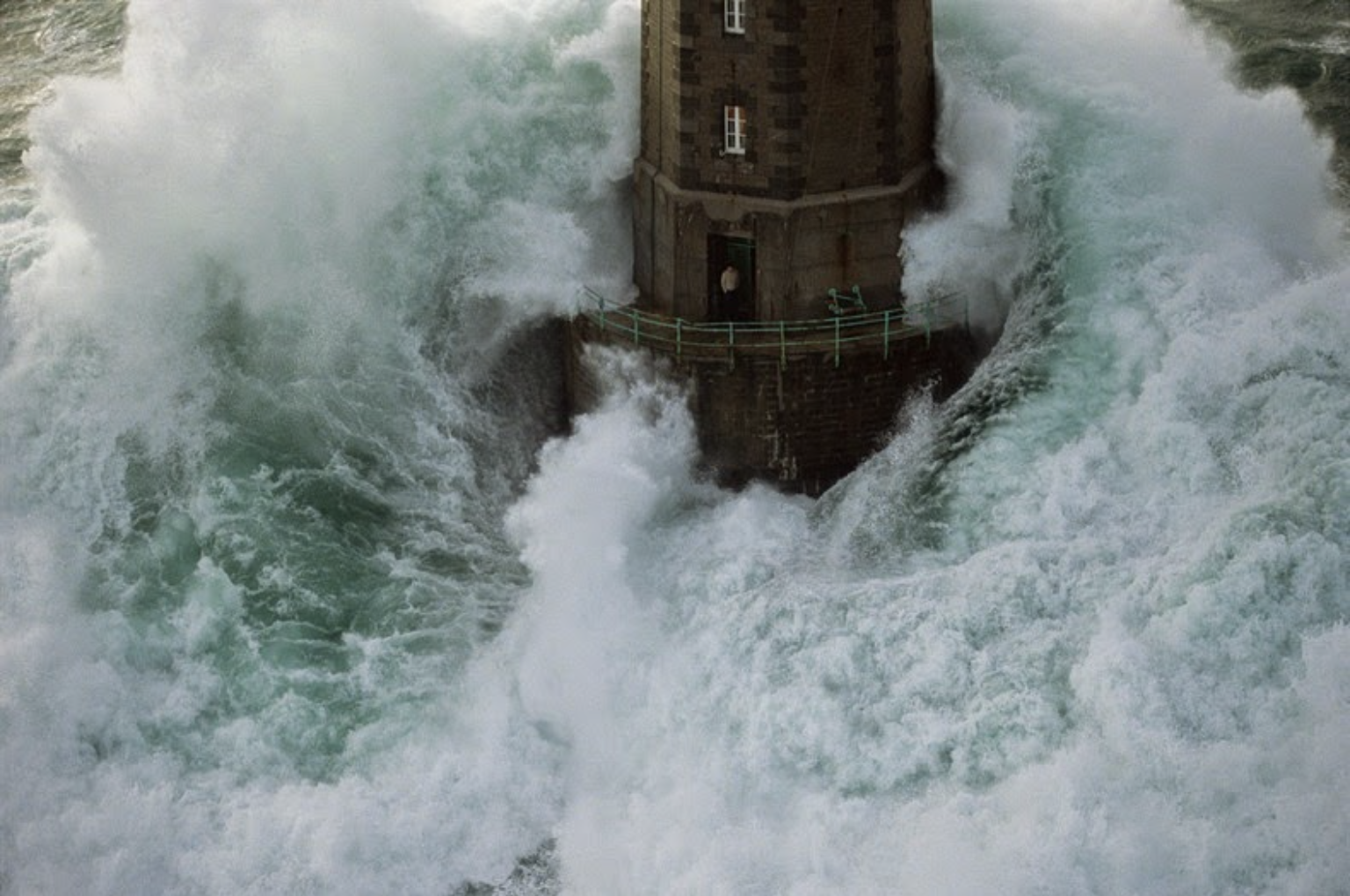
Posted in A Poet's Education, Images, The Daily Poems | Tagged Bereft, Robert Frost | Leave a Comment »
Posted in A Poet's Education, Images, The Daily Poems, The Reading Journals | Leave a Comment »
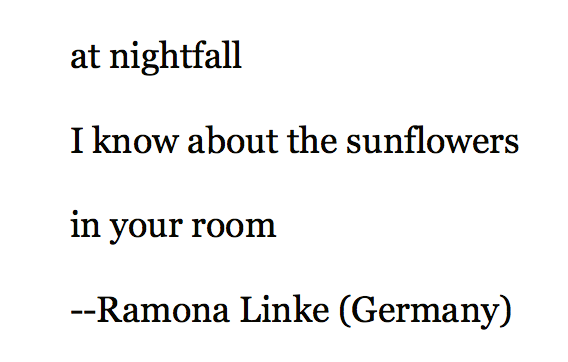

~ Gabriel Zech (Sollars Elementary)
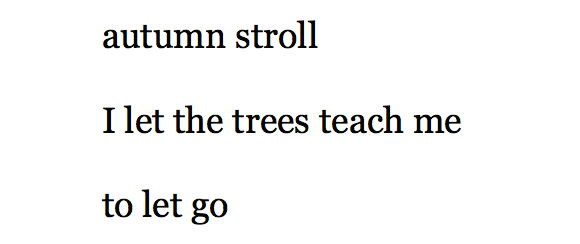 ~ Pat Davis (Pembroke, NH)
~ Pat Davis (Pembroke, NH)

~ Lee Nash (France)
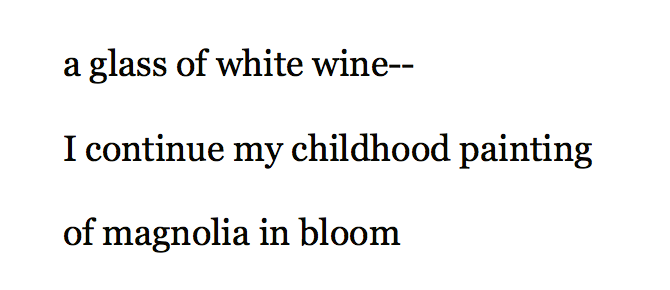
~ Ana Drubot (Bucharest)
Posted in A Poet's Education, Images, Poetry Lessons, The Daily Poems | Tagged Asahi Haikuist | Leave a Comment »
winter solstice
our son reads a fairy tale
to his unborn child

I dreamed your garden lights
were fireflies
the pull
of an old scar
for her mother
bluets
roots and all
hazy moon
the nun begins her journey
with a backward glance
an open window
somewhere
a woman’s wordless song
sweet peas
tremble on the trellis
the bride’s “I will”
a woman embroiders
a unicorn

on the dark rose
our reflections
a girl plays hopscotch
by herself
on the harp strings
Christmas Eve

he patiently untangles
her antique silver chain
cardinals in the birdbath
scatter drops of light
fingers splayed
above a starfish
through open windows
he lifts the veil
a young man fast asleep
beside his cello
the story of her life
day lilies close
at the graveside…
blue glass shines

Posted in A Poet's Education, Images, Poetry Lessons, The Daily Poems, The Reading Journals | Tagged haiku, Peggy Willis Lyles | 1 Comment »
Posted in A Poet's Education, Images, Observations, The Daily Poems, The Reading Journals | Tagged haiku and the brain research, Haiku Foundation | Leave a Comment »

The farther we go
The harder it is
To rewrite the past
© 2018 Jason A. Muckley
Posted in Uncategorized | Leave a Comment »
4. a “turn,” or a sudden change of heart, if you will, found in the third line of the prose sections. Jeannine Hall Gailey goes from introducing a seemingly easy-going, cheerful visitor to a terrifying, blood-soaked seer in her haibun “Rescuing Seiryu, the Blue Dragon”:
You met the dragon in the garden. Sometimes he flies in circles outside your window. This morning he appeared as a young boy. / He shows you a vision of your parents, lying in a barn. With his face so close you smell hay. / He bleeds from the wounds of paper birds, from a swallowed curse. Can your healing rice cake keep him from death?
https://www.poets.org/poetsorg/text/more-birds-bees-and-trees-closer-look-writing-haibun
Posted in A Poet's Education, Rants, The Daily Poems | Tagged Aimee, blue dragon, haibun, jeannine hall gailey, Nezhukumatathil, rescuing seiryu | Leave a Comment »


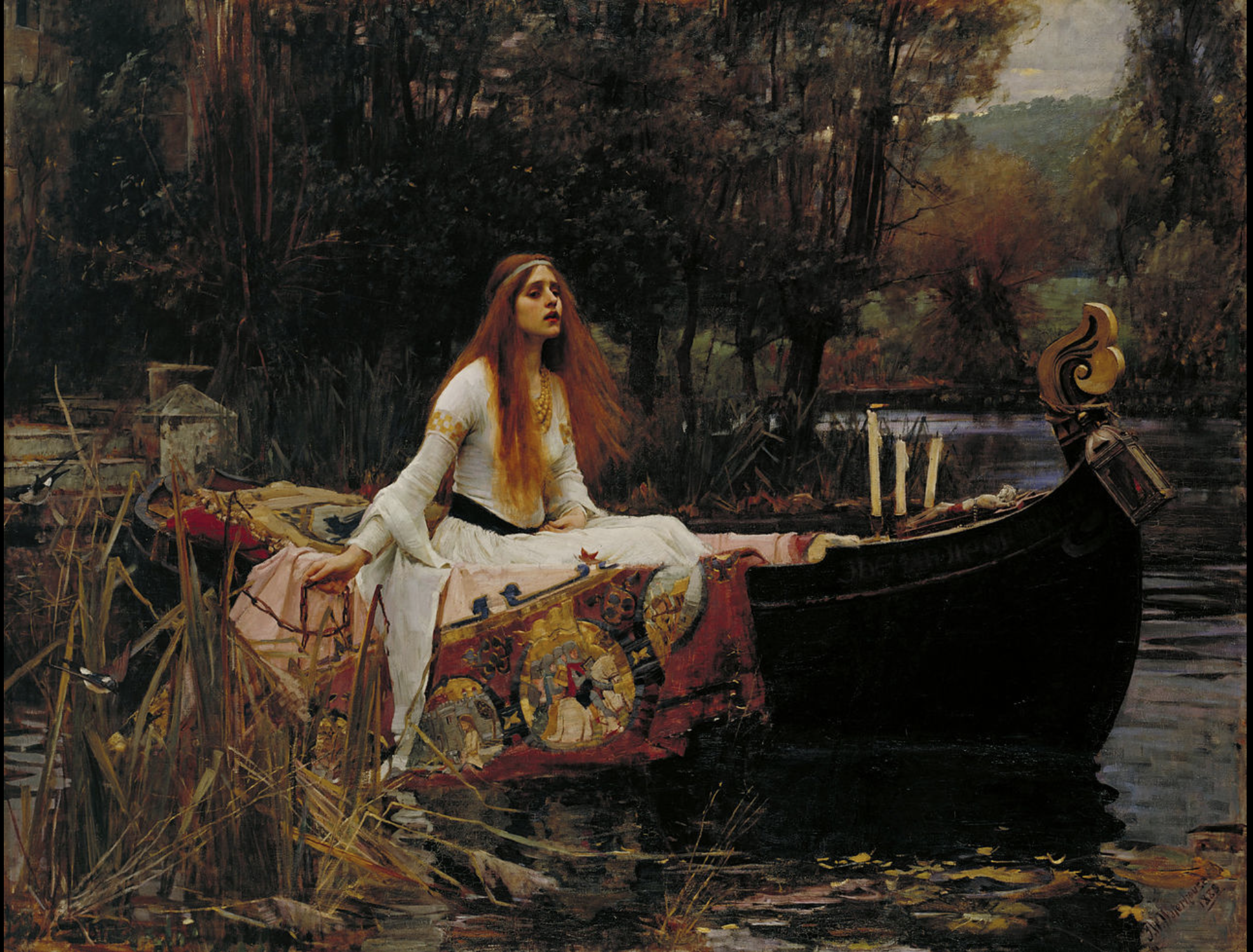
Posted in A Poet's Education, Images, The Daily Poems | Tagged Alfred Lord Tennyson, Lady of Shallott | Leave a Comment »
Posted in A Poet's Education, Images, The Daily Poems | Tagged Alfred Lord Tennyson, illuminated, Morte d'Arthur | Leave a Comment »

